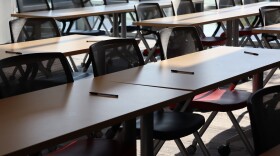The September 11 terrorist attacks dramatically changed how people interact along the U.S.-Mexico border.
Gone are the days of driving to Tijuana for a quick taco for dinner and back home at your normal bed time.
Now the norm is hours of waiting in line, numerous documents and a likely inspection.
Chris Maston is the director of field operations for U.S. Customs and Border Protection in San Diego. He remembers when very few travelers were screened while crossing the international border.
Then Osama bin Laden and al-Qaida attacked the U.S. in New York City, Washington D.C. and Pennsylvania.
Now more than 110,000 people entering the country at the ports of entry at San Ysidro and Otay Mesa are given a second look.
“Clearly 9/11 transformed our strategy at the border forever," Maston said. "We queried very few of the travelers that crossed the border through our law enforcement databases prior to 9/11. Today, we query virtually everyone.”
This has led to many complaints, especially from businessmen and government officials in Tijuana, about long border waits hurting commerce in Mexico.
Officials said they are trying to address the issue. One of the solutions is a new “Ready Lane” at the Otay Mesa border crossing.
It will allow travelers with documents that have an embedded radio chip to use a special lane. This includes travelers with a U.S. Passport Card, a SENTRI card, a Border Crossing Card and the new resident “Green Card”.
You can even have people with different documents in the same vehicle. Officials explained that the chips will automatically send the information of travelers to agents at the border, saving precious time in the screening process.
Tijuana Mayor Carlos Bustamante welcomed the change. People who have used the lane at other border crossings have crossed the border about 20 percent faster.
“What we are trying to do is improve the time so we can again start seeing more American tourists coming into Tijuana," Bustamante said. "That’s our main concern”
Officials stress they remain vigilant in the wake of the killing of bin Laden. Although no visible signs of upgraded security were evident Monday, Maston said there are many actions federal agents are taking that may not be evident to border crossers.
This included pre-screening people and gathering intelligence on potential threats, he said.








